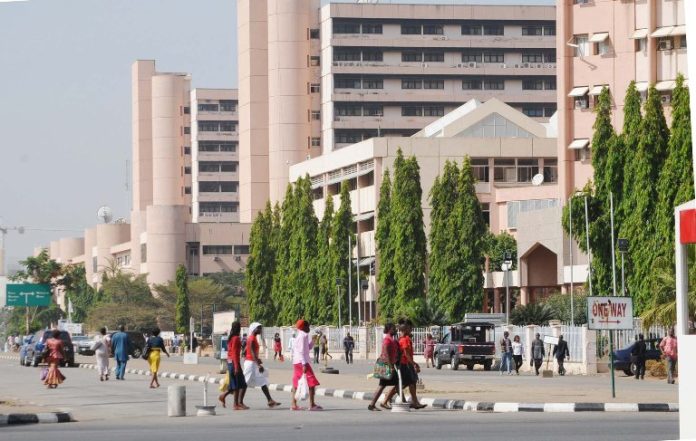FG Announces Date For Commencement Of New Minimum Wage

The Federal Government on Thursday said a new minimum wage regime would come into effect on April 1, 2024.
The Minister of Information and National Orientation, Idris Mohammed, who disclosed this in an interview in Abuja, said the current N30,000 minimum wage would expire at the end of March 2024.
Mohammed said this on Thursday as an analysis of the 2024 –2026 Fiscal Framework budgets by our correspondents indicated that the Federal Government would spend N24.66tn on salaries in 2024, 2025, and 2026.
Following the removal of the fuel subsidy by President Bola Tinubu on May 29, 2023, the Federal Government agreed to pay N35,000 to each of its workers to cushion the effect of the subsidy removal.
But the organised Labour insisted that the N35,000 wage award was a temporary measure, adding that the minimum wage should be reviewed in 2024.
READ ALSO: Leaders Without Fear Of God Are Dangerous — Obasanjo
The Federal Government’s team and the Joint National Public Service Negotiating Council on October 18, 2019, agreed on the implementation of the N30,00 minimum wage after months of negotiations.
However, Labour unions on Thursday confirmed that they had started a negotiation process with the Federal Government, adding that based on the country’s labour law, the minimum wage should be reviewed every five years.
The Nigeria Labour Congress National President, Joe Ajaero, recently said, “It is open knowledge that the review of the national minimum wage is a matter of the law which is expected to happen in 2024.”
On his part, the Minister of Information and National Orientation, Mohammed, told The PUNCH that the improved take-home pay was meant to replace the temporary palliative measure put in place by the government to ameliorate the hardship caused by the fuel subsidy removal.
New wage regime
He said, “Certainly, there is a new wage regime that will come in on April 1, 2024. That is why these palliatives were targeted so they would cushion economic hardship before then. In our negotiation with Labour, we said that the wage issue was not something one could just fix. A committee that will also involve Labour itself will work on it.
“The committee is being constituted and we are talking to Labour about it. And by the time this current wage regime expires by the end of March, we will expect that a new wage will begin by April. It is in this wage regime that we will now have a proper salary structure for workers across the length and breadth of Nigeria. We expect that the private sector and state governors will also do the same.”
A top official of the NLC, in an interview with The PUNCH, said the organised Labour had initiated talks with the government
He said, “By April 1, 2024, the current minimum wage will expire. We have all agreed to set up a national wage negotiation committee, and that the committee should comprise all parties.’’
Also, the Head of Information of the NLC, Benson Upah, in an interview with The PUNCH said, “The new minimum wage is to come into effect next year.”
N24.66tn for salaries
As the organised Labour demands a new minimum wage, an analysis of the 2024 –2026 Fiscal Framework shows that the Federal Government intends to spend 29.18 per cent of its total budgets for 2024, 2025, and 2026 on salaries, overheads, and pensions.
The total amount budgeted for these three items amounts to N24.66tn; 29.18 per cent of the N84.50tn budgeted for the three years.
With anticipated salary increases from 2024 amid worsening economic conditions, personnel costs, and the two others are expected to jump by 8.51 per cent from the amount (N7.36tn) budget in 2023 to N7.99tn in 2024.
It is then expected to rise by 2.41 per cent to N8.18tn in 2025, and then by 3.77 per cent to N8.49tn in 2026. The amount pales when compared to the N23.37tn (27.65 per cent of its total budget) the government intends to spend on capital expenditure in the period under review.
This signifies the continuation of a culture of high overheads at the expense of high fiscal deficits. As of the end of September 2023, the Federal Government had devoted 29.76 per cent (N3.78tn) of its total spending (N12.7tn) on salaries.
The amount spent on salaries is 157.14 per cent more than the N1.47tn that has been spent on capital allocations for the year.
The government said, “The actual spending was N12.7tn. Of this amount, N5.79tn was for debt service, and N3.78tn for personnel costs, including pensions.
“Only about N1.47tn (25 per cent of the pro-rata budget) has been released for MDAs’ capital expenditure as of September 2023.”
The Federal Government has about N1.5 million workers and it will review minimum wage by 2024. There are concerns that the government is operating a bloated civil service with many agencies with overlapping functions. This has led to calls for agency mergers and scrapping, where they might apply.
With salaries weighing heavily on its spending, the government, in its 2024 – 2026 fiscal framework, said, “The budget deficit is projected to be N9.18tn in 2024, i.e., N4.6tn down from N11.60tn budgeted in 2023.
“The proposed deficit represents about 50 per cent of total Federal Government’s revenues and 3.88 per cent of the estimated GDP (Gross Domestic Product ). The high projected level of fiscal deficit in 2024 is partly attributable to the proposed salary review of Federal workers across board, increased pension obligations, and higher debt service cost.
“At 3.88 per cent, the projected level of deficit is higher than the three per cent threshold stipulated in the Fiscal Responsibility Act (FRA), 2007, but significantly lower than the 2023 level of 6.11 per cent; FRA 2007, however, allows the government to exceed the 3 per cent threshold if justified by threats to national security.”
The fiscal deficit for the three years under review is expected to total N30.89tn. In June 2023, the World Bank disclosed that the Federal Government’s spending on personnel costs and debt servicing exceeded total revenues in 2022.
According to the Washington-based bank, this was the first time the Federal Government’s personnel costs and debt servicing surpassed its total revenue. It noted that the government is spending a lot on these costs, leaving little room for capital expenditure.
It declared, “Overall, the rigidity of expenditure has increased, squeezing fiscal space for the discretionary spending needed to meet development objectives.
Personnel costs and interest payments comprise a growing share of total general government expenditures (59 per cent in 2022) and for the first time in 2022 exceeded total government revenues (102 percent).”
Rising personnel cost is leaving little room for investments in infrastructure and in his budget presentation speech, President Bola Tinubu disclosed that the government would leverage the private sector to plug its capital expenditure spending holes.
He said, “In view of the limited resources available through the federal budget, we are also exploring Public Private Partnership arrangements to finance critical infrastructure.
“We, therefore, invite the private sector to partner with us to ensure that our fiscal, trade, and monetary policies, as well as our developmental programmes and projects, succeed in unlocking the latent potential of our people and other natural endowments, in line with our national aspirations.”
Recently, the Minister of Budget and National Economic Planning, Abubakar Bagudu, declared that the government was only managing to pay salaries considering its dwindling revenue sources.
The minister represented by the Director (International Cooperation), Dr Sampson Ebimaro at an event said, “Government faces enormous challenge especially now, the government is facing revenue deficit. There’s no money anywhere in the country, the government is just managing to pay salaries.
“The growth rate is very slow, and the population growth is fast pacing and increasing. unemployment is surging amid high inflation. These are issues which non-governmental organisations must take on board in helping the government to cover the space government could not cover.”





